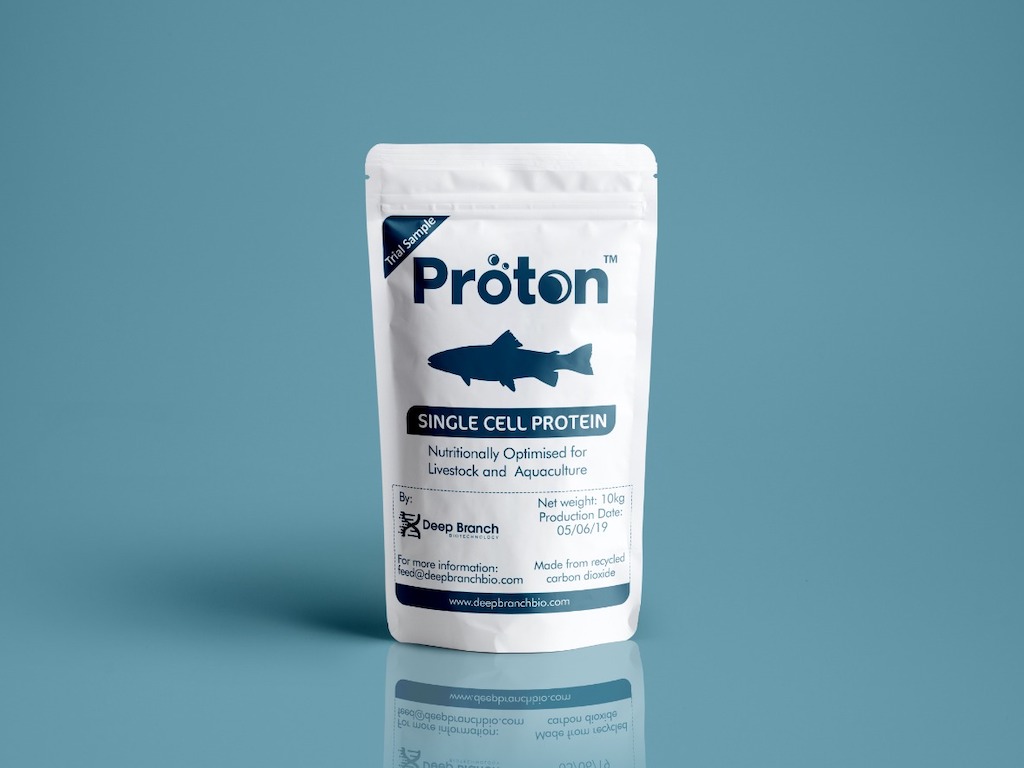3 Mins Read
U.K. biotech firm Deep Branch is set to scale-up its sustainable animal feed made from recycled carbon. After securing a €2.5 million (US$3.03 million) grant from the European Innovation Council (EIC), the company says it will be building a new facility in the Netherlands to begin operating next year and expedite the performance testing process of its new protein.
Founded by three former PhD students from Nottingham’s Synthetic Biology Research Centre (SBRC), Deep Branch uses microbes to convert industrial emissions into sustainable protein sources. The process of gas fermentation enables conversion of carbon dioxide into a new type of single-cell protein, which the startup has dubbed Proton – and it’s now ready to scale-up this technology with the help of its new €2.5 million (US$3.03 million) accelerator funding from the EIC programme.
We are developing a new, sustainable way of producing animal feed, which reduces CO2 emissions by more than 90 percent, compared to the currently used protein sources.
Peter Rowe, CEO, Deep Branch
Deep Branch plans to construct its facility at the Netherlands-based Brightlands Chemelot Campus, an innovation hub for circular chemistry processes, and begin operating its plant by the second quarter of this year to produce and begin testing Proton, which boasts a comparable nutritional profile as fishmeal, but is far lower in carbon footprint and can be produced year-round without being impacted by seasonal fluctuations.
“In the U.K., and in Europe, poultry and farmed fish are usually fed on fishmeal and soy, which is mainly imported from South America and has a huge environmental impact. We are developing a new, sustainable way of producing animal feed, which reduces CO2 emissions by more than 90 percent, compared to the currently used protein sources,” said Peter Rowe, CEO of Deep Branch.
Read: Is the future of food making protein out of thin air?
The industrial site gives us the ability to scale up quickly and has room for a large-scale production facility as well as the raw materials to create Proton. We have access to everything we need.
Peter Rowe, CEO, Deep Branch
After scaling its production of Proton, the startup says it will be undertaking trials with animal feed giants BioMar and AB Agri before expanding its capacity to match the volumes that feed producers require.
“Brightlands Chemelot Campus is the ideal location for our Scale-Up Centre, and there is a clear alignment between our goals and the facility’s overall ambitions for CO2 recycling and sustainable hydrogen use. The industrial site gives us the ability to scale up quickly and has room for a large-scale production facility as well as the raw materials to create Proton. We have access to everything we need,” explained Rowe.
This isn’t the first time that startups have sought to create sustainable products by capturing carbon from the air. Finnish biotech Solar Foods has developed a proprietary natural protein ingredient made from thin air dubbed Solein, which can be used to create sustainable alternative meat and food products. The solution has already won them the support of Business Finland, the country’s public innovation fund, which it says will fuel its growth and commercialisation plans.
Another venture, Sky Diamonds, set up by British clean energy entrepreneur Dale Vince, has created lab-grown diamonds made from capturing carbon dioxide directly from the air we breathe. According to Vince, they’re the world’s first “zero-impact” gems that are carbon negative, meaning they absorb more carbon during the production process than it emits, and will be released as soon as next year.
Lead image courtesy of Deep Branch.




